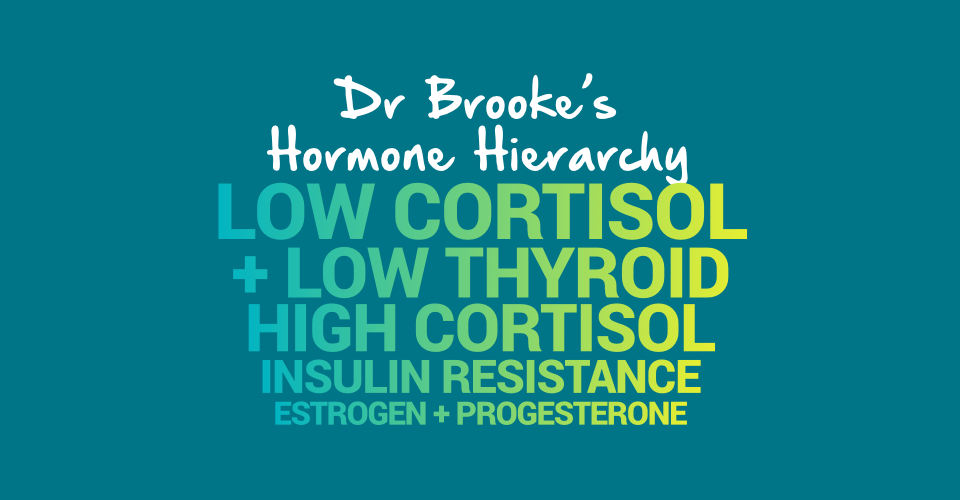
If you’ve been tired, stressed, depressed, anxious, having trouble sleeping, gaining weight or you’re experiencing worsening PMS, changing cycle lengths or heavier or lighter periods you may have wondered: Is it my hormones?
Hormone testing is important to know how your hormones are faring but keep in mind that hormone testing is only part of the story. Your symptoms also matter, especially for hormones that respond so much to your diet, exercise and lifestyle such as insulin and cortisol. And these hormones talk to you all day, every day, by way of your symptoms: appetite, cravings, energy and sleep.
This guide covers hormonal testing and thyroid patterns and will show you how to suss out the Hormonal Dealbreakers of inflammation, anemia and blood sugar problems. Get your FREE copy of my Guide To Lab Testing & Your Hormones
Unfortunately, most women see these symptoms as a pain in the rear, a source of frustration that all too often they brush aside as not that bad or all my girlfriends feel this way or I’ll deal with this later, when I have more time. Women most often don’t see these annoying symptoms as a beacon from their hormones, shining a light on exactly what’s wrong.
It’s not your fault, no one has ever taught you how to listen to your hormones and what those symptoms mean. Better, yet how you can use those symptoms to guide you to do exactly what you need to do to feel better.
How powerful is that? Knowing in real time how your hormones feel about your current diet and lifestyle? Understanding how your hormones are talking to you, what message they want you to hear is one of the most empowering things you can learn – it’s life changing.
And it’s more simple than you’d think! Your hormones are talking to you all day, telling you in real time what you can do differently to feel better. And this easy to remember acronym ACES is sorta like your secret hormone decoder ring giving you a ton of insight into those key hormones: insulin and cortisol.
But Dr Brooke, what about my female hormones: estrogen and progesterone?
Well they talk to you too, see this post (article to be posted still) to understand what they are trying to tell you.
However, insulin and cortisol are at the top of my Hormone Hierarchy for a couple of reasons:
They have a ripple effect across your entire hormone landscape impacting all of your other hormones – if they are out of balance, it is almost impossible to have a healthy thyroid or better balance with estrogen and progesterone.

They are hormones you have the most control over. You may need help with optimizing your thyroid (especially if you need medication) and targeting the specific ways to support estrogen and progesterone levels, but you have control over (for the most part anyway) what you eat, if you’re getting enough sleep and how you’re managing your stress.
Hormones leaving you feeling confused, frustrated or stuck?
If you’re ready to clear up the confusion and mixed messages you’ve heard about hormones, diet and exercise; to feel at home in your body at last; and to be healthy and happy again, welcome.
Work with Dr. BrookeAnd finally, they are talking to you all day and responding in real time to what you ate and your stress levels. So let’s learn how to listen.
Here’s what your hormones are trying to tell you:
Appetite Whether your appetite is high, low, or normal is largely regulated in response to blood sugar balance and the hormones insulin and cortisol. It is also impacted by information directly from your gut (via the hormone ghrelin), your brain (via Neuropeptide Y among others), and your fat cells themselves (via leptin).
Cravings Food cravings are largely due to blood sugar swings and thus the hormones insulin and cortisol are responsible (you’ll see this pattern over and over again in this book; thankfully, this plan focuses on these two hormones you can largely control). Cravings are also impacted by brain chemistry imbalances, primarily involving serotonin and dopamine. Interestingly, the balance of your brain chemistry itself is largely affected by blood sugar, and thus insulin and cortisol come into play again.
Energy Your energy level is all about blood sugar balance, which is affected by your stress hormones (cortisol, adrenaline) and your storage hormone (insulin, which stores glucose, fat and amino acids.) and also has a lot to do with thyroid hormone levels and activity (do you have enough , are they in the right form, are they getting into a cell for activity, etc.). There are also some basic but often overlooked causes of low energy including overt or borderline anemias (lack of B12, folic acid, B6 or iron), deficiencies in other nutrients such as CoQ10 or carnitine (necessary to metabolize fat as fuel), food sensitivities (which can cause your energy to crash after a meal), and inflammation (which can make you feel weighed down and sluggish). This one is a bit more complicated than variables A and C, but rest assured we’re going to address each one of these causes of low energy by the end of the four-week reset.
Sleep When sleep is off (you can’t fall asleep or stay asleep) cortisol is typically involved. Estrogen-progesterone imbalances can also affect sleep because they can hinder optimal levels of serotonin and GABA (gamma-Aminobutyric acid) making it harder to calm down and fall asleep.
Again, understanding your ACES can feel like you’ve been given a secret hormone decoder ring. Tuning in and working with these signals will help you find what you really need to be eating, how you need to exercise, and the care you need to give to lifestyle issues like stress and meditation in order to keep your hormones happy, your energy high, and your overall health optimized.
How to Use Your ACES
We quite literally wrote the book on this so if you don’t have Hangry, grab it now!
In Hangry we walk you through how to interpret your ACES and make changes based on these cues combined with what you know about your hormone balance either via testing or by taking a symptom based quiz. There is a quiz in Hangry or you can take it online here.
In short, think of your ACE variable like this:
Changes in your ACE symptoms first thing in the morning or between meals most often reflect issues with cortisol being too high or too low. Changes in your ACE symptoms within 30 minutes of a meal have to do with how well your insulin mechanism is working. Sleep will be impacted by blood sugar (thus insulin) but is even more impacted by cortisol. HIgher cortisol can make it difficult to fall asleep whereas frequent waking can indicate lower cortisol and having a hard time keeping your blood sugar stable throughout the night when you’re asleep.
Again, this is what Hangry is all about.

